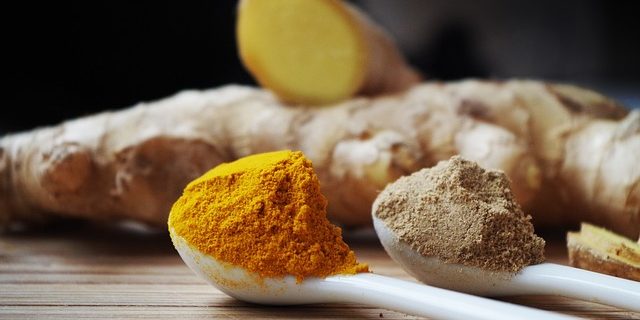The Ginger plant, Zingiber officinale, is native to southeast Asia, and its pungent roots have a long history of culinary and medicinal use. The gnarled, beige rhizomes also grow wild in Africa and Australia, and it is cultivated in many other warm climates of the world.
You can easily grow ginger in a pot at home. Pick up some fresh ginger roots at the grocery store and bury them at least an inch under the soil. Put them in a sunny window, water generously, and soon you’ll have green shoots, beautiful flowers, and you’ll be able to harvest your own fresh ginger by breaking off the rhizomes beneath the soil. In the summertime, they can live outside.
Ginger has such an incredible range of uses that some medical traditions consider it a panacea. From a powerful medicine, to a cooking spice, to a key ingredient in cosmetics, ginger is a valuable herbal ally.
The Many Uses of Ginger
Ginger has been used medicinally for many thousands of years. Indian, Chinese, and Arabic medical texts all discuss ginger at great length. One of ginger’s most famous uses is as an anti-nausea herb. It is also excellent for digestion, circulation, and as an anti-inflammatory. Ginger increases our ability to absorb nutrients from our foods, and it increases the potency of other herbs and medicines we may be taking.
Ginger can provide relief for motion sickness, diarrhea, vomiting and loss of appetite. Many people have used ginger to soothe an upset stomach.
Menstrual cramps, muscle soreness, respiratory infections, osteoarthritis and other types of pain or inflammatory conditions may be improved by the use of ginger as well. The juice of ginger is sometimes also used as a topical ointment for burn relief.
Additional Considerations
Ginger for medicinal purposes is available in many forms, including whole or dried root, crystallized roots, capsules or extracts. Ginger is a blood thinner, so you should consult your doctor if you are already taking a blood-thinning medication. Ginger is considered to be a safe supplement for most people, but it can cause digestive upset especially in excessive amounts.
Taking ginger with food may help with this potential side effect. If you are pregnant or have medical concerns of any kind, your doctor should be consulted before you use ginger for medicinal purposes. Dried ginger should not be used by pregnant women.
Adding ginger to your herbal regimen is an investment in enhancing your health with a natural product. Ginger has helped many people with health needs throughout history, and it can help you as well.
Easy Ginger Tea
- Finely chop fresh ginger root until you have a palmful of chopped root.
- Place it in a medium saucepan of water and bring to a boil.
- Cover, reduce heat, and simmer for 10-15 minutes.
- Strain and enjoy, adding lemon juice and honey to taste.
The more ginger you use, and the longer you simmer, the stronger your tea will be. This tea is extremely helpful for digestive complaints, menstrual cramps, nausea, joint pain, poor circulation, and the list goes on.








